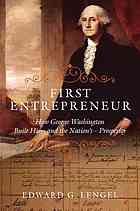
First Entrepreneur
How George Washington Built His—and the Nation's—Prosperity
کتاب های مرتبط
- اطلاعات
- نقد و بررسی
- دیدگاه کاربران
نقد و بررسی

February 8, 2016
Lengel, director of the Washington Papers project at the University of Virginia, views a familiar subject through the unfamiliar lens of entrepreneurship, showing how the first American president set the nation on a course of prosperity. The book chronicles Washington's business affairs, from his near-obsessive financial ledgering as a teenager, to the windfall inheritance at age 20 that catapulted him solidly into Virginia's upper gentry, to his drawing up his will in the days preceding his death in 1799. Washington comes across as an ambitious opportunist, quickly seeking out and courting Martha, a wealthy widow, to beat out other potential suitors. Her late husband's substantial fortune, combined with his own inherited holdings, made him one of the most affluent men in Virginia. Washington made astute business decisions, including switching from tobacco to wheat production and grinding neighbors' wheat for a profit, along with missteps, such as a doomed plan to sell flour in the West Indies. Lengel also offers an enlightening examination of Washington's strategies as head of the Continental Army and later as president. While Lengel's argument that Washington was a master entrepreneur is not entirely convincing, he does provide an insightful look at a lesser-known aspect of this iconic figure.

December 15, 2015
A study of the Founding Father encapsulating some of the early American values of industry, parsimony, and prudence. It's no surprise that George Washington was a prosperous man, from landed Virginia gentry to building and growing Mount Vernon. Historian Lengel (Thunder and Flames: Americans in the Crucible of Combat, 1917-1918, 2015, etc.), whose stewardship of Washington's papers at the University of Virginia allows him intimate access into his subject's mindset, emphasizes the founder's motivating belief that a free exchange of virtuous interests would ultimately unite the young country. Owning land was the first definer of wealth in the Colonies, and in his capacities as surveyor and land investor, Washington also understood the necessity of harnessing the growth of tobacco. Marriage to the wealthy widow Martha Custis "offered George a shortcut to fortune" and greatly increased his vast acreage, allowing the couple and her children to live rather luxuriously, even frivolously, until the Revolution tempered Washington's ideas about self-sufficiency and frugality. Henceforth, the not terribly educated but creative and incisive Virginian resolved to replace tobacco at Mount Vernon with wheat, thereby skirting British merchants directly, and he also added an innovative gristmill so the wheat and flour could be sold domestically. Washington's own road to economic freedom mirrored that of the nascent nation. In his delineation of Washington's role as military chief, Lengel makes some compelling assertions about the general, especially when he was mired in Valley Forge with scant supplies and a mutinous army. "Money is the sinews of war," Washington declared, advocating for soldiers' wages, eliminating waste, upholding transparency, and even establishing at the fort a "public market" with local farmers and tradespeople to sell directly to the army. The author organically traces the evolution of Washington's free market thinking through his first and second presidential terms: building a national economy, encouraging domestic manufacturing, establishing a central bank, and developing a sense of unity of purpose. A deeply researched and nicely handled biography.
COPYRIGHT(2015) Kirkus Reviews, ALL RIGHTS RESERVED.

February 15, 2016
George Washington (1732-99) served several roles throughout his career, but to military historian Lengel (Inventing George Washington), chief among these positions, and the through line of this brief and admiring biography, was businessman. Lengel attributes Washington's hardwired business sense and lifelong fear of debt to the relentless practicality and self-discipline his mother instilled in him in his youth. These traits carried the future founding father into a surveying career which, combined with a large inheritance and wife Martha's wealth, boosted him into the Virginia planter elite. At his Mount Vernon estate he was a meticulous micromanager and "fanatical account-keeper" but also a shrewd investor: his risky but prescient (and profitable) switch from tobacco to wheat in the 1760s foretold his savvy handling of battlefield challenges alongside upkeep of his many properties, dealing with an inept Congress, and the colonies' wartime currency crisis. Guiding his standard-setting presidency above all was his view that the colonies' economic and political interests were "one and the same." VERDICT Presidential history buffs will feel more fulfilled by Ron Chernow's Washington: A Life, but business-minded readers interested in a niche interpretation of America's first chief executive will learn plenty.--Chad Comello, Morton Grove P.L., IL
Copyright 2016 Library Journal, LLC Used with permission.

























دیدگاه کاربران